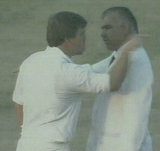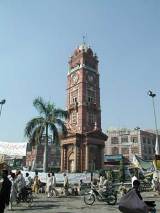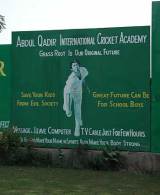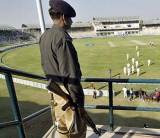Sunday November 20

|

Getting the point - Gatting and Rana and that incident
© Getty Images
|
|
If you can give a dog a bad name then the same is undoubtedly true of
towns. Especially unfashionable ones such as Faisalabad. As if the poor
place didn't already have an image problem, then Mike Gatting's
contretemps with Shakoor Rana on the 1987-88 tour has ensured that it will
live on in the annals of infamy long after Shahid Afridi has smacked six
sixes in the first over tomorrow to give the long-suffering citizens a
proper sporting reason to be remembered.
The Shakoor Rana affair is gone but not forgotten in these parts. On the
eve of the match, ARY Digital banished all notion of a taboo by
interviewing the man who captured the moment for posterity. Graham
Morris's grainy black-and-white image of the England captain prodding a
Pakistani umpire in the chest has become one of the sport's iconic images - a
moment so powerful and myth-busting that, for many, it ruined for ever
that cosy old saying: "It's just not cricket".
"It was about five minutes from the close of play and most of the snappers
had packed up, ready to go home," recalled Morris. "I was standing to the
right of the pavilion, and the incident occurred over there, just in front
of square-leg." It was almost too dark for a clear-cut view, but the
incident came and went before anyone else could complete a frenetic
scramble for their cameras.
The fall-out from the affair was messy and protracted. England had been
simmering at the perceived injustice of several umpiring decisions all
series, and neither Gatting nor Rana was in any mood to compromise their
stance. The whole of the third day was lost to the dispute, the rest day
was restless as the England team quarrelled with its administrators as to
how best to proceed, and play only resumed on the fourth morning when
Gatting produced a terse one-sentence apology for his alleged "bad
language".
"I still to this day get people ringing up for the rights," added Morris,
who had been contacted by Sky Sports on the very day he flew out to
Pakistan. For a professional photographer, it was the perfect example of
being in the right place at the right time, though the same was not true
for Gatting, who was stripped of the captaincy the following summer.
Ostensibly it was for an alleged dalliance with a barmaid, but the TCCB
was fooling no-one.
Suspicion between England and Pakistan lingered for years afterwards - not
least during an acrimonious 1992 series - but five years ago, Faisalabad
did its bit for the kiss-and-make-up process. On that occasion the English
journalists were welcomed back to a ground they had not frequented for 13
years with a special souvenir brochure.
It was delivered "with love from Pakistan", and inside were pictures of
all the players on both sides, plus the "great and admirable
administration of Faisalabad" and, most wonderfully of all, large photos
of Prince Charles and the "unrememberable" Princess Diana. Well, they do
say that laughter is the best medicine .
Saturday November 19

|

'It is difficult to put into words how much of an anachronism the clocktower (or "Ghanta Ghar") is'
© Andrew Miller
|
|
Faisalabad is known as "the Manchester of Pakistan". Unfortunately, for
anyone seeking a touch of northern exotica, that nickname has less to do
with its nightlife and world-famous sports teams (although the Faisalabad
Wolves, cricket's inaugural 2020 club champions, might beg to differ) and
more to do with its proliferation of cotton mills.
An industrial town par excellence, Faisalabad was founded in 1890 as
Lyallpur by the then-Governor of the Punjab, Sir James Lyall - whose
great-grandson, coincidentally, is the current British High Commissioner
in Islamabad.
Lyall senior, we can surmise from a quick glance at a map of the town
centre, was an orderly and extremely patriotic man. His original design
was laid out in the shape of a Union Jack, and in 1905 a clocktower was
erected at the centre, in "Grateful Remembrance of the Empress Queen
Victoria". Home from home for all these visiting Englishmen, then.
Faisalabad has expanded somewhat since the glory days of Empire, mind you,
and it has attracted some serious money in the last five years as well. In
fact, "the Reading of Pakistan" might actually be a more accurate moniker.
A brand-new motorway means it lies just one hour's commute from the hustle
and bustle of Lahore, and consequently it shares with Reading that strange
combination of money, investment and vapidity.
The town's expansion is perhaps epitomised by the rise and rise of
Interloop, the sponsors of the aforementioned Faisalabad Wolves. They
started out in 1992 with just 18 weaving machines; they now have 1600 and
a workforce of 6000, and have transformed themselves into, wait for it,
the world's second-largest sock manufacturer. So there we have it. It's an
utterly unglamorous claim to fame. But, to judge by the Pakistani
equivalent of Chelsea Tractors that cruise along the already choked
highways, it's a decidedly lucrative one nonetheless.
In his poem "Jerusalem" (England's newly-adopted cricket anthem) William
Blake made bleak reference to the nineteenth-century proliferation of
"dark satanic mills", and granted, such edifices don't exactly draw in the
sightseers. It seems they don't enthrall the townsfolk either - as one
local tourism official once put it: "there is nothing of interest to a
tourist in Faisalabad".
That is not strictly true, of course, because for this visitor at least,
the town centre is an absolute must-see. It is difficult to put into words
how much of an anachronism the clocktower (or "Ghanta Ghar") is. It is
built of the same reddish-pink brick that characterises much of the
British architecture in Lahore, with the initials "VR" carved in white
around its middle. It would have graced any university or public building
in the land.
But instead it is plonked in the middle of a spider's web of dusty brown
bazaars and street vendors, with a fleet of donkey carts milling around
its base, all dragging unreasonably large amounts of fabrics over the dry
undulating mud tracks. A palm tree stands at one corner of the tower, (a
useful guide to navigation, given the improbable symmetry of the roads
that surround it) and at one stage a camel moped its grumpy way around the
base, dragging a vast trailer of vegetables.
Those vegetables were no doubt destined for some of the local restaurants
which comprise a sizeable proportion of the businesses in the town centre.
Each doorway is guarded by three or four vast pots of curry, with banks of
colourless tables stretching into the cavities behind, and all around an
amalgam of fabric shops, tailors and electrical stores complete the
picture. Faisalabad may not be of interest in the conventional sense, but
boring isn't quite the word I'd use to describe it.
Thursday November 17

|

'You know it's Christmas when Michael Atherton is battling away in some far-off country to save a Test'
© Getty Images
|
|
I was digesting England's defeat while emptying my inbox last night, when
a message from my friend John popped up. "It's oddly nostalgic watching
England collapse," he wrote. "It's like in the good old days when only us
saddos were interested."
It was a very fair point indeed, made all the more pertinent by the
circumstances in which he had been watching the debacle. Like countless
other reformed saddos who can't resist the odd relapse, John had awoken at
stupid o'clock in London's bleak midwinter, just so he could say he had
seen the moment of victory. To be so bitterly disillusioned so early in a
working day is, as Ian Bell put it after being castled by the doc,
"character-building".
No wonder English cricket fans are such a placid bunch. You have plenty time for
pondering in those dismal hours before dawn, especially when your TV or
radio is acting as a harbinger of gloom. In theory, I spent three years -
from 1997 to 2000 - doing a university degree in philosophy and politics.
In practice I spent it watching Athers's Caribbean swansong end in tears
and recrimination (1997-98), the Gaffer's Ashes odyssey end in a travesty
of a run-out reprieve for Michael Slater (1998-99), and most horrific of
all, 2 for 4 and all that at Johannesburg 1999-2000 - `nuff said.
Of course, that didn't leave a whole lot of time for university work, but
not to worry - I'd already got a lifetime of philosophising under my belt,
courtesy of England in Australia 1990-91, England in India 1992-93,
England in Trinidad 1993-94, England in Australia 1994-95, England in
Zimbabwe ... you get the picture.
Someone once wrote: "You know it's Christmas when Michael Atherton is
battling away in some far-off country to save a Test". Whoever it was, he
was only half-right. You knew it was Christmas when England finally
delivered their one-off Ashes consolation win, or when Angus Fraser took 8
for 75 to storm Fortress Bridgetown. These were the once-a-year wonders
that consoled us saddos throughout the barren years of the 1990s.
For the past 12 months, however, it's been Christmas every day of the
year, and the festive cheer and merriment has been shared throughout the
country - at the expense, it would seem, of the rest of the cricket-playing world. But England's cricketers are an altruistic bunch, and yesterday their disappointment translated into unconfined joy for some of their more bitter recent victims. Barely seconds after the final wicket
had fallen, Australia started to shimmer to the sound of mocking laughter.
"Who would have thought that my favourite Christmas gift could be
delivered by the Pakistan cricket team?" wrote Paul Brewster, one of our more militant antagonists of last summer. Poor Paul worked himself into
an alarming lather during the Ashes, with daily bombardments about
"holding a gun to England's head" and "stamping one's feet on English
throats". I must admit, I rather feared for his wellbeing after September
12 - he went so quiet.
But he's back, and so are his countrymen, and England - by implication -
are back where they belong. Meanwhile, us saddos take solace in the fact
that, this setback notwithstanding, we've never had it so good.
Wednesday November 16

|

Sadly, judging by the nets, the youngsters aren't taking the advice of this poster
© Getty Images
|
|
One of the joys of the subcontinent, and there are many, is the ability to flop back in your hotel room at any time of day, and find cricket - involving any side and beamed from any era - being shown on one of the myriad channels of Asia's burgeoning Cable TV network.
Not everyone is as impressed as I am with the proliferation of Cable. While England were training at the Gadaffi Stadium in Lahore last week, for instance, I passed a sign for the Abdul Qadir Cricket Academy. "Save your kids from evil society!" implored the poster. "Leave computer, Cable TV for just a few hours, make your name in sports, also make your body strong."
Sadly, to judge by the derelict nature of the nets being advertised, the battle had already been lost. We can only hope that the viewing habits of the lost generation are suitably selective, and that they sift through the reams of horrific Indian soaps such as "Kyun ke saas bhi kabhi bahu thi" (which seems to be based entirely on one lame mother-in-law gag) until they hit upon the educational gems lurking on the other channels.
Last night, for instance, I enjoyed a chicken ginger TV dinner and a re-run of that epic Lord's one-day final of 2002, when England scored 325 and India still went on to win. It was quite alarming to see how much the team has changed in the space of three years. No Nasser Hussain, no Alec Stewart, most definitely no Ronnie Irani. Alex Tudor was there, which took me by surprise, while Nick Knight was still a stalwart at the top of the order.
The biggest mystery, however, was the unrecognisably fluffy-haired speedster who tore in with the old ball in a bid to wrench the match back from India's grasp. It was quite a shock when I realised just who I was watching. With his left arm making great gyratory arcs, a massive pivot around his susceptible back, and a spring-heeled followthrough from a man who is no ballet dancer (regardless of the occasion backflip), this was none other than Andrew Flintoff, a year before his full awakening as a Test cricketer.
Look at him now, a model of channelled aggression, a uniform core of energy released from the shoulders with nothing filtered down to his back. Under the tutelage of England's bowling coach, Troy Cooley, Flintoff has cut out the thrust and focused the fury, to become the most complete quick bowler currently operating.
I knew nothing of biomechanics until I had seen this before-and-after comparison, but thanks to the much-maligned TV replay, I'm beginning to see what it's all about. There's a treasure trove of information to be gleaned out there, if - like Flintoff - you find the right channel.
Tuesday November 15

|

Security remains tight
© Getty Images
|
|
This Multan match is turning into one of the best-natured Tests in Anglo-Pakistani history. It has compromised two evenly matched sides and four hard days of competitive but scrupulously fair cricket, in front of a crowd so unpartisan that several of the locals have taken to supporting England.
Last year we saw the power that the game can wield in these parts, when Pakistan played host to one of the most cathartic Test tours in history. Thousands of Indians flooded across the border for the first time since Sachin Tendulkar was a 16-year-old debutant, and left a month later with their pre-conceptions quashed and generations of animosity forgotten.
Which is why it's such a shock to be jolted back to the present, as was the case this morning when news of the Karachi bomb blasts began reverberating around the press box. Doubt and speculation soon began filing down the phonelines, and by tea, Shahrayar Khan, the PCB chairman, was seeking to assuage doubts about the security in place for Karachi's one-day international on December 15.
"We will not allow terrorists to undermine what we know to be good," said Shahrayar during a passionate but reasoned appeal to common-sense, and as he spoke, a pair of local newsmen in the front row could be seen nodding their heads vigorously. In normal circumstances, such sycophancy would be frowned upon, but then, what wasn't there to agree to?
A recent bomb blast in Delhi didn't deter Sri Lanka's cricketers. Two bomb blasts in Lahore didn't curtail Australia A's visit. Not even the July bombings in London were enough to postpone the Ashes. Though Shahrayar was perhaps being simplistic to describe it as a "global phenomenon", he was right to underplay the impact that it would have on England's cricketers.
Having travelled within the "presidential" levels of security that accompany this tour, it's fair to say that things will be very different in Karachi in a month's time. Both this attack, and those on Christians in a town near Faisalabad, were random acts of violence at opposite ends of a vast land. The real Pakistan is the one that has turned out in their thousands in the stands, not those that have lurked in their handfuls in the shadows.
Monday November 14
They say that if you look like your passport photograph, then you are quite clearly ill. Sadly, in the subcontinent, that excuse simply isn't allowed to wash. It turns out I really am that ugly. It's an insult to the cameraman if I dare to pretend otherwise.You might have noticed that this diary is two days late. That is because I am the sort of person who likes to leave things to the last minute. If Cricinfo ever decide that my witterings are getting too off-beat, I could always apply for a job at the Indian Cricket Board - in their fixtures and scheduling department. They value my kind over there.
I get especially tardy when bureaucracy is involved. Yesterday, for instance, the last minute hurtled up and tapped me disconcertingly on the shoulder, when I realised that it was now or never if I was ever going to get my visa extended. They get a little shirty about such things over here, and with some justification
Multan isn't exactly blessed with tube stations, though, so finding an instant photograph booth and rattling off four snappy snaps in my lunch break wasn't really an option. Finding any shop at all between the hours of 8am (when I set off for the ground), and 10.59pm (the last minute of my last deadline), was nigh on impossible.
Happily, after a rickshaw yomp across every chowk in town, salvation was at hand at Galaxy Laboratories - Multan's market-leading 24-hour portrait photographers. Any size of print, from an inch to a furlong, in just 15
minutes. Absolutely ideal for my purposes.
It's passport photography, but not as I know it. For starters, there's no getting away with your usual unshaven 1000-yard stare. As you perch on the stool and make to put your 50 rupees in the slot, the photographer's
assistant erects two white umbrellas to muffle the flash, and manipulates you into the perfect photo-friendly posture. Knees together, shoulders back, twist the torso, hold the pose. Click!
It's alarmingly perfect - fully in focus, fully in frame, and gleefully unforgiving of the frazzled circumstances in which it was created. Perhaps the last minute isn't the best minute after all.




